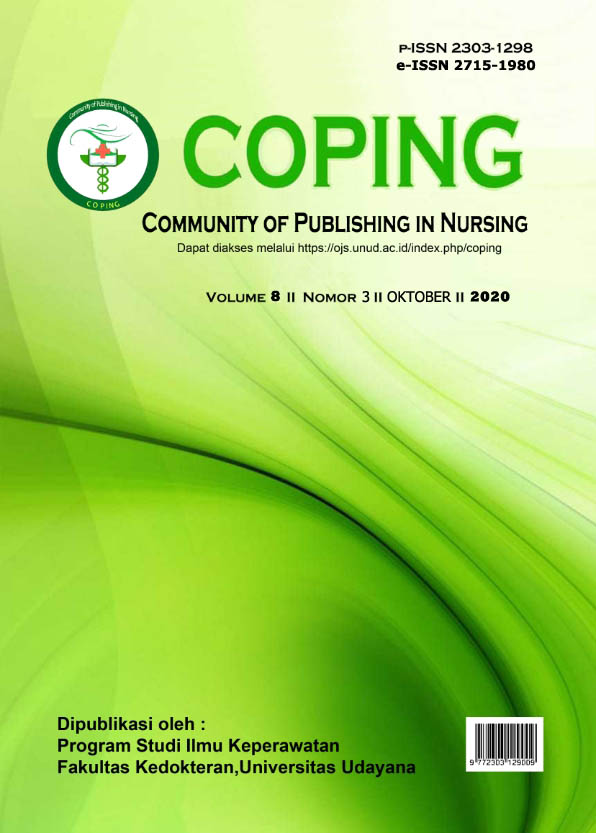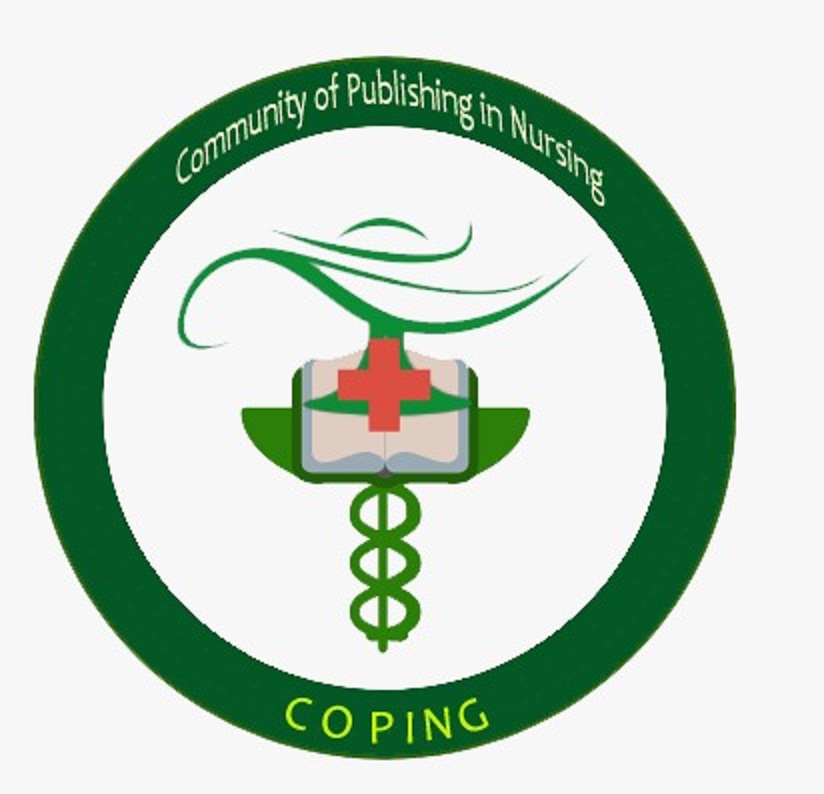HUBUNGAN KOMUNIKASI ORANG TUA-ANAK DENGAN STRES AKADEMIK MAHASISWA TAHUN PERTAMA PROGRAM STUDI SARJANA KEPERAWATAN DAN PROFESI NERS FK UNUD
Abstract
First-year students belong to the age of late adolescents who experience emotional instability and are unstable facing problems, so they are more susceptible to academic stress. Academic stress is the biggest factor affecting student academic performance. Family support plays a role in reducing academic stress. The basic foundation for achieving good family support is communication created between parents and children. This research aims to seekkthe relationship of parent-child communicationnwithkacademic stress students of first-year students SchooliofiNursingiFacultyiof MedicineiUdayanaiUniversity. Theumethodkusedninuthis study was correlative with a cross-sectional design. Attotalusampling conducted on 61 students who had met the inclusion and exclusion criteria and analyzed using Pearson Product Moment analysis.nAccordingttotthetstudy thatthastbeentdone, it wasdfoundedythat there wasiaiweakinegative relationshipibetweeniparent-child communication with academic stress (r = -0,363; p-value = 0,004; ? = 0,05). The better parent-child communication, the lower the academic stress experienced by first-year students SchooluofiNursingjFacultyjofiMedicineiUdayanaiUniversity. This study provides an overview of students, parents, and educational institutions to be able to pay attention to students related to academic stress and can improve communication between parents and children.
Downloads
References
Augesti,nn G., Lisiswanti,fsfg R., Saputra,O., Nisa, K. (2015). Perbedaan tingkat stres antara mahasiswa tingkat awal dan tingkatsdgffakhir fakultas kedokteranfgsf ffssuniversitas lampung. Journal Mahority, 4(4), 50-56. Diakses dari http://juke.kedokteran.unila.ac.id
Ernawati, ssL., & Rusmawati, ffD. (2015). Dukungan sosial orang tua dan stres akademik pada siswa smk yang menggunakan kurikulum 2013. Jurnal Empati, 4(4), 26-31. Diakses dari https://ejournal3.undip.ac.id
Gadzella, B., Baloglu, M., Masten, W., & Wang, Q. (2012). Evaluation of the student life-stressfsggg inventory-revised. Journalk of Instructional Psychology, 39(2), 82-91.
Gunandar, M.S. & Utami, M.S. (2017). Hubungan antara dukungan sosial orang tua dengan penyesuaian diri mahasiswa baru yang merantau. Gadjah Mada Journal of Psychology, 3(2), 98-109.
Lailiana, N.A., & Handayani, A. (2017). Motivasit berprestasi ditinjau dari gkomitmen terhadap tugaswttt pada mahasiswa. Elic, 89-96. Diakses dari jurnal.unissula.ac.id
Mardiati, I., Hidayatullah, F. Aminoto, C. (2018). Faktor eksternalgd tingkatd fstres mahasiswa keperawatan dalam adaptasi proses pembelajaran. Urecol, 172-181.
Oktovia, W., Zulharman & Devi. R. (2012). Hubungan kecerdasan emosional dengan tingkat stres pada mahasiswa tahun pertama fakultas kedokteran universitas riau. (Skripsi, Universitas Riau).
Purwati, S.g (2012). Tingkatf gstres akademik pada mahasiswa reguler angkatan 2010 fakultas ilmu keperawatan universitas indonesia. (Skripsi, Universitas Indonesia). Diakses dari http://lib.ui.ac.id
Putri, D.L. (2014). fHubungan antaraf dukungan sosial oang tua dengan prokrastinasi akademik pada mahasiswa fakultas psikologi universitas kristen satyabwacanaysalatiga. (Skripsi,ffUniversitasff Kristen Satya Wacana). Diakses dari http://repository.uksw.edu
Sutjiato, gfM., gKandou, G., & Tucunan,fA. (2015). Hubungan faktordginternal danceksternal dengangg tingkatr stres pada mahasiswafgdgkgg fakultas kedokteran universitas sam ratulangi manado. JIKMU, 5(1), 30-42. Diakses dari https://ejournal.unsrat.ac.id
Wijaya, A., & Naryoso. (2017). Komunikasikfmf interpersonal lintassf generasidg untuk menghadapiw strese rakademik pada anak. Interaksigh Online, 18(2), 1-7.







